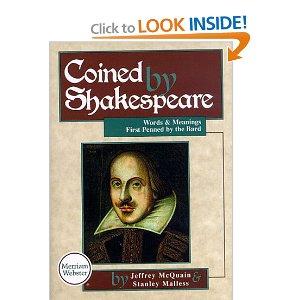Cummings
Guides Home..|..Contact
This Site..|..Shakespeare
Videos..|..Shakespeare
Books
.
A fool's
paradise.—Romeo and Juliet.
A
foregone conclusion.—Othello.
A
horse! A horse! My kingdom for a horse!—Richard III.
Alas,
poor Yorick! I knew him.—Hamlet.
A
little pot and soon hot.—The Taming of the Shrew.
All
the world's a stage.—As You Like It.
All's
well that ends well.—All's Well That Ends Well.

As
. . . luck would have it.—The Merry Wives of Windsor.
As white as driven snow.—The
Winter's Tale.
Beware
the ides of March.—Julius Caesar.
Blow,
blow, thou winter wind.—As You Like It.
Brave
new world.—The Tempest.
Brevity
is the soul of wit.—Hamlet.
Cold
comfort.—King John.
Come
full circle.—King Lear.
Come
what may.—Macbeth.
Conscience
does make cowards of us all.—Hamlet.
Cowards
die many times before their deaths.—Julius Caesar.
Crack
of doom.—Macbeth.
Death
by inches.—Coriolanus.
Dish
fit for the gods.—Julius Caesar.
Dog
will have its day.—Hamlet.
Done
to death.—Much Ado About Nothing.
Double,
double, toil and trouble; fire burn, and cauldron bubble.—Macbeth.
Eaten
me out of house and home.—Henry IV.
Elbow
room.—King John.
Et
tu, Brute! [Latin: And you, Brutus!]—Julius Caesar.
Every
inch a king.—King Lear.
Fatal
vision.—Macbeth.
Flaming
youth.—Hamlet.
Frailty,
thy name is woman.—Hamlet.
Friends,
Romans, countrymen, lend me your ears.—Julius Caesar.
Give
the devil his due.—Henry IV.
Green-eyed
monster.—Othello.
Halcyon
days.—Henry VI.
Hearts
of gold.—Henry VI Part I.
Her
infinite variety.—Antony and Cleopatra.
Hold
a candle to.—The Merchant of Venice.
I
am fortune's fool.—Romeo and Juliet.
I
cannot tell what the dickens his name is.—Merry Wives of Windsor.
I
have not slept one wink.—Cymbeline.
I
must be cruel, only to be kind.—Hamlet.
In
my mind's eye.—Hamlet.
It's
a wise father that knows his own child.—The Merchant of Venice.
It
smells to heaven.—Hamlet.
It
was Greek to me.—Julius Caesar.
 Kill
. . . with kindness.—The Taming of the Shrew. Kill
. . . with kindness.—The Taming of the Shrew.
Lend
me your ears.—Julius Caesar.
Let
slip the dogs of war.—Julius Caesar
Lord,
what fools these mortals be!—A Midsummer Night's Dream.
Love
is blind.—The Merchant of Venice (Shakespeare appears to have copied
this line from Chaucer's Love Is Blynd).
Lov'd
not wisely, but too well.—Othello.
Merry
as the day is long.—Much Ado About Nothing.
More
sinned against than sinning.—King Lear
My
own flesh and blood.—The Merchant of Venice.
My
salad days, when I was green in judgement.—Antony and Cleopatra.
Neither
a borrower nor a lender be.—Hamlet.
Neither
rhyme nor reason.—As You Like It.
Now
is the winter of our discontent.—Richard III.
Once
more unto the breach.—Henry V.
One
fell swoop.—Macbeth.
Out,
damned spot!—Macbeth.
Out
of the question.—Love's Labour's Lost.
Paint
the lily.—King John.
Parting
is such sweet sorrow.—Romeo and Juliet.
Play
fast and loose.—Love's Labour's Lost.
Primrose
path.—Hamlet.
Put
out the light.—Othello.
Seamy
Side.—Othello.
Short
and the Long of It.—Merry Wives of Windsor.
Smooth
runs the water where the brook is deep.—Henry VI, Part II.
Something
is rotten in the state of Denmark.—Hamlet.
Something
wicked this way comes.—Macbeth.
Something
in the wind.—The Comedy of Errors.
Sorry
sight.—Macbeth.
 Sound
and the Fury.—Macbeth. Sound
and the Fury.—Macbeth.
Spotless
reputation.—Richard III.
Star-cross'd
lovers.—Romeo and Juliet.
Strange
bedfellows.—The Tempest.
Sweets
to the sweet.—Hamlet,
What's
in a name?—Romeo and Juliet.
The
devil can cite Scripture for his purpose.—The Merchant of Venice.
The
first thing we do, let's kill all the lawyers.—Henry VI.
The
lady doth protest too much.—Hamlet.
The
play's the thing.—Hamlet.
The
quality of mercy is not strained.—The Merchant of Venice.
The
short and the long of it.—The Merry Wives of Windsor.
The
working day world.—As You Like It.
The
world's mine oyster.—The Merry Wives of Windsor.
There
is a tide in the affairs of men.—Julius Caesar.
They
say an old man is twice a child.—Hamlet.
This
was the noblest Roman of them all.—Julius Caesar.
Though
this be madness, yet there is method in't.—Hamlet.
Throw
cold water on it.—The Merry Wives of Windsor.
'Tis
neither here nor there.—Othello.
To
be, or not to be: that is the question.—Hamlet.
Too
much of a good thing.—As You Like It.
To
thine own self be true.—Hamlet.
Unkindest
cut of all.—Julius Caesar.
We
are such stuff as dreams are made of.—The Tempest.
What's
past is prologue.—The Tempest.
Woe
is me.—Hamlet.
..
 .
.
|

Kill . . . with kindness.—The Taming of the Shrew.
Sound and the Fury.—Macbeth.